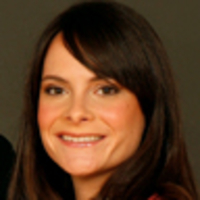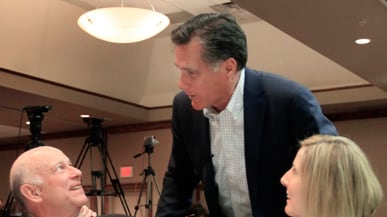Mitt Romney is on the road, dropping into early primary states—not officially campaigning, because he isn’t an official candidate yet—but securing high-dollar donors and bundlers, making the Ask.
He’s made stops in important primary states like Florida and has trips planned for another early state, Nevada. The former and would-be candidate also met with donors in New York City and Washington, D.C. this week. When all is said and done, the money tour is expected to hit 30 cities including stops in Los Angeles and Detroit.

Fundraisers in some of these meetings say Romney is planning to announce his exploratory committee—the step before an official announcement—in mid April. The Romney team wouldn’t comment on a timeline or fundraising at this time.
Donors that are getting ready to open their checkbooks or already have say that Romney has said he needs to raise $50 million quickly. Some donors say this is to intimidate his primary rivals and officially enter the race with a showing of strong financial force.
“With all elections, of course, early money is better than late money, so he’s trying to get people going, raising as much money as they can as quickly as they can,” said former chairman of Goldman Sachs and longtime Romney friend John Whitehead.
A big-money donor from Florida—who said he’s already had to break the hearts of soon-to-be Romney rivals like Tim Pawlenty, Haley Barbour, and Newt Gingrich—agreed.
“You get as many people on board as you can and you come out of the chute raising as much money as you can, because money is nothing but voice, and if you don’t have a big voice then you don’t have much of a campaign,” the Florida donor said.
The meeting Thursday in New York City attracted about 100 donors to the Harvard Club. Investment banker and John McCain's 2008 finance chairman Lewis Eisenberg helped organize the breakfast, which drew other big GOP donors that backed McCain in '08, including lobbyist and former McCain fundraiser Wayne Berman and New York Jets owner Woody Johnson. Financier Patrick Durkin, attorney Phil Rosen, former Massachusetts Governor Bill Weld, former treasury official in the George W. Bush administration Emil Henry, and Whitehead were also in attendance.
"I do believe that by the time we’ve reached November 2012...both presidential candidates, Romney and Obama, will have raised and spent a billion dollars."
Fundraisers at the breakfast said Johnson functioned as master of ceremonies, and donors said they knew walking in that they were committing to fundraise over $25,000 with the hopes many would raise as much as $100,000.
In an interview, Weld said Romney was self-deprecating and funny and he was pleased to see so many former McCain and Giuliani financial backers in the room.
“I thought the interesting thing was that most of the McCain and Giuliani fundraisers from last time were there, and I believe that Rudy last time raised $17 million and McCain raised $10 million in the tri-state area, and Mitt raised only five, so obviously having that expansion is going to be helpful,” Weld said.
Weld added that the meeting was less about scaring potential rivals and more about Romney knowing how much cash it takes to run an effective campaign, mentioning a similar fundraising push in January of 2007.
“I think Mitt is a very prudent businessman. He’s very data driven. He knows what he needs to do and he’s focusing on it with laser-like intensity,” said Weld. “He sounded not just like a presidential candidate. He sounded like a president.”
Attendees say Romney was “fired up,” knew all questioners by their first name, and his talk was interrupted several times by applause.
In an interview with The Daily Beast, Eisenberg said his goal is to be out fundraising as much as he can to raise as much money as possible for Romney, and although $50 million may be the goal now, the final number for the entire campaign is much higher.
"I do believe that by the time we’ve reached November 2012...both presidential candidates, Romney and Obama, will have raised and spent a billion dollars,” Eisenberg said.
Earlier this month, Romney fundraiser and GOP donor Mel Sembler held a similar meeting at his house in St. Petersburg with about 40 donors. Like the New York City breakfast, Sembler’s luncheon was more about getting people ready to fundraise large amounts of money than raising money at the actual event. It was what one participant at the St. Petersburg lunch called “a fundraiser to help get fundraisers.” And since Romney is still not a declared candidate, right now he just wants to make sure the cash is ready to go when he does get in next month.
“What he’s basically doing is putting a team together of individuals who will be ready to go as soon as he announces," said the same donor at the St. Petersburg event. "So he’s flying around the country and making sure everyone is on aboard and touching all the right people and doing all the right things."
Two weeks ago, Romney had a similar lunch at the home of prominent South Florida heart surgeon Dr. Zachariah Zachariah in the Ft. Lauderdale area. Zachariah was a high-dollar fundraiser for George W. Bush and was cleared last year of federal insider-trading charges. In an interview, Zachariah said there were about 30 people at the event, and although he didn’t want to mention any names he said they were prominent South Florida donors whom he has “worked with for many years.”
Zachariah, Whitehead, and Weld mentioned the issues that Romney spoke about in the fundraising meetings, previewing talking points that he is sure to push during the campaign—including his health-care plan in Massachusetts and how he plans to combat comparisons to President Obama’s health-care plan.
“He thinks that the state should have the right to do what they want to do and not to have a national mandate and shove it down people’s throat,” said Zachariah. “President Obama would like to make it sound like it’s the same, but if [Romney] can explain it to the American public -- the difference between the two -- I think he has a great chance to get the nomination and be president.”
Zachariah said Romney stressed in the meeting that he never counseled the White House on its health-care plan, although David Axelrod has said President Obama’s plan is based in part on Romney’s.
At the Harvard Club, Romney also spoke about foreign policy, the uprisings in the Middle East, American exceptionalism--and zinged Obama on jobs.
“He said essentially that the president is a good guy, but doesn’t seem to be particularly attuned to job creation. As a matter of fact that’s an understatement from what he said, and he was just very winning,” said Weld.
Donors in Florida say Romney plans to travel back to that important early state after he announces his exploratory committee in April. Zachariah said he didn’t have a specific financial goal yet for fundraising, but says that when Romney does announce, Sunshine State donors “have to raise a substantial amount of money” in order to win the Florida primary.
Although Iowa and South Carolina look difficult for Romney, he is hoping to win New Hampshire. Early polling in the first-in-the-nation primary state has been good. Romney has a lake house there, and a built-in support base ready to go when he does announce. He also hopes to take the early state of Nevada, which he won in 2008, and a win in Florida could potentially give him enough momentum to grab the next states in line and head to victory.
“That’s his main primary. That will be the challenge,” said Zachariah. “The challenge is to win the primary (in Florida).”
Romney will stop in Las Vegas next week to speak at the Republican Jewish Coalition Annual meeting and in May plans a large fundraising push in the city.
Shushannah Walshe covers politics for The Daily Beast. She is the co-author of Sarah From Alaska: The Sudden Rise and Brutal Education of a New Conservative Superstar. She was a reporter and producer at the Fox News Channel from August 2001 until the end of the 2008 presidential campaign.






